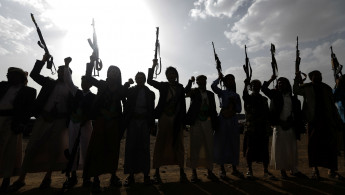Leader's death a 'big blow' for Yemen's Houthi rebels
Yemen’s Houthis suffered a major setback with the killing of their political chief in a Saudi-led coalition airstrike, analysts say, in a signal of Riyadh’s determination to pursue its military campaign against the rebels.
Saleh al-Sammad, the head of the Iran-backed Houthis’ main political body, died Thursday in a strike in Yemen’s western province of Hodeidah.
He was the most senior Houthi official killed by the coalition since launched its intervention against the insurgents in March 2015.
Analysts say that despite renewed efforts to find a negotiated solution to the conflict, the latest strike shows not just Riyadh’s willingness to continue on the military path, but the coalition’s increasing effectiveness.
“There is no other option at this stage,” said Mustafa Alani, an analyst at the Gulf Research Center. “The Houthis are not flexible on the political settlement and – people are not noticing – there is real progress on the ground for the coalition.”
While not often in the spotlight, Sammad was no minor figure. As head of the Houthis’ Supreme Political Council, he was in effect the president of the vast areas of Yemen under rebel control.
“This is certainly a key setback,” said Adam Baron of the European Council on Foreign Relations.
“With regards to targeting Houthi leaders, it represents the biggest hit for the coalition so far – and suggests their intelligence capabilities are improving.”
Sammad was killed along with six others in the strike.
The Houthis’ overall leader, Abdelmalek al-Houthi, said the action “won’t go unanswered.”
Another Western expert, speaking on condition of anonymity, said Sammad was a “reasonable” person who had taken part in peace negotiations and that his death is “a setback for prospects for productive talks.”
Alani said the hit was part of a trend of targeted strikes by the coalition, with at least 25 field commanders also recently killed.
“It is important,” Alani said.
“Those people always have a way to protect themselves and their movements are always top secret because they know they are being targeted. So it is an achievement.”
Much international attention has focused on the coalition’s air raids, which have been criticised for hitting civilians. A strike on a wedding on Sunday that rebels blamed on the coalition killed at least 23 people.
But Alani said coalition forces – who include Saudi and Emirati troops in support of pro-government fighters – have also been making discreet progress on the ground.
“There are not big victories but they are slowly moving toward four major cities in Yemen,” he said, including Sanaa, Saada in the Houthis’ northern heartland, the economic capital of Taiz in the southwest and the Red Sea port city of Hodeidah.
The Houthis in the meantime have intensified ballistic missile attacks into Saudi territory, including several intercepted attacks on Riyadh.
Alani said this is a sign of the increasing pressure on the rebels.
“They are now in a purely defensive position on the ground. They are just trying to maintain their control and there are problems. So the easiest way is to fire missiles ... to answer to the pressure on the ground.”
The coalition is backing forces loyal to President Abed Rabbou Mansour Hadi, who was forced into exile by the Houthi advance. His hold on the country is tenuous and there have been suggestions Hadi could be forced out, but for now Riyadh and its allies seem content with their ally.
The Houthis suffered another setback last year with the collapse of their alliance with ex-president Ali Abdullah Saleh, who was gunned down in December following accusations he was ready to strike a deal with Saudi Arabia.
Yemen’s civilians meanwhile continue to suffer through one of the world’s most devastating conflicts.
More than 10,000 people have died since the start of the Saudi-led intervention in March 2015, leaving tens of thousands have been wounded.
Widespread shortages of food and medicine – in a country already among the poorest – have caused what the United Nations has described as the world’s worst humanitarian crisis.





 Follow the Middle East's top stories in English at The New Arab on Google News
Follow the Middle East's top stories in English at The New Arab on Google News
![Israeli forces ordered bombed Gaza's Jabalia, ordering residents to leave [Getty]](/sites/default/files/styles/image_330x185/public/2176418030.jpeg?h=a5f2f23a&itok=_YGZaP1z)

